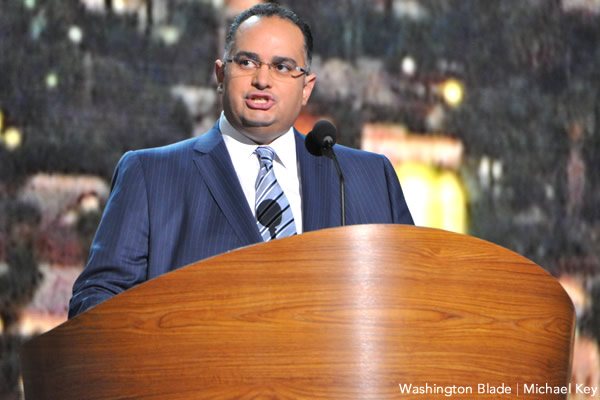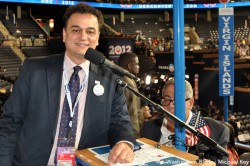National
DNC 2012: Clinton delivers rousing speech at convention
Defends Obama on economy, attacks Romney


Former President Bill Clinton addressing the Democratic National Convention (Blade photo by Michael Key)
CHARLOTTE, N.C. — A rousing speech from former President Bill Clinton that capped off Wednesday night at the Democratic National Convention was well-received by attendees, although the day wasn’t free of controversy.
Clinton took to the podium at the Time Warner Cable Arena to call formally for the nomination of Barack Obama as the Democratic nominee for president, but not before taking digs at Republican nominee Mitt Romney and others for what he said were false assertions about the current administration.
Among the accusations made by GOP vice residential nominee Paul Ryan that Clinton disputed was the claim that Obama robbed Medicare of $716 billion in an effort that could imperil the benefits of seniors.
“Here’s what really happened,” Clinton said. “There were no cuts to benefits. None. What the president did was save money by cutting unwarranted subsidies to providers and insurance companies that weren’t making people any healthier. He used the saving to close the donut hole in the Medicare drug program, and to add eight years to the life of the Medicare Trust Fund. It’s now solvent until 2024. So President Obama and the Democrats didn’t weaken Medicare, they strengthened it.”
The former president, who signed welfare reform into law in 1996, also took issue with Republican claims that Obama had waived the work requirement for welfare reform — an assertion echoed last week by former U.S. Sen. Rick Santorum on stage at the Republican National Convention.
“When some Republican governors asked to try new ways to put people on welfare back to work, the Obama administration said they would only do it if they had a credible plan to increase employment by 20 percent,” Clinton said. “You hear that? More work. So the claim that President Obama weakened welfare reform’s work requirement is just not true, but they keep running ads on it.”
Clinton also came to Obama’s defense on the economy, saying the economic situation that had befallen the nation in 2008 under the Bush administration was so dire that Obama couldn’t be expected to reverse course in just one term in office, but more progress should be seen in a second term.
“President Obama started with a much weaker economy than I did,” Clinton said. “No president — not me or any of my predecessors could have repaired all the damage in just four years. But conditions are improving and if you’ll renew the president’s contract you will feel it.”
The former president also touted Obama’s signature legislative achievement — the Affordable Care Act — saying claims that it amounts to a government takeover of health care are untrue.
“Soon the insurance companies, not the government, will have millions of new customers — many of them middle class people with pre-existing conditions,” Clinton said. “And for the last two years, health care spending has grown under 4 percent, for the first time in 50 years. So are we all better off because President Obama fought for it and passed it? You bet we are.”
Clinton, who signed into law “Don’t Ask, Don’t Tell” and the Defense of Marriage Act, made no reference to LGBT issues during his remarks. The former president has come out for marriage equality and has since called for DOMA repeal and an end to the military’s gay ban before it was ultimately lifted.
But Clinton did express gratitude to former President George W. Bush for creating the President’s Emergency Plan for AIDS Relief when talking about the accomplishments of former Republican presidents and how he could never hate the GOP the way the far right hates Obama.
“I am grateful to President George W. Bush for PEPFAR, which is saving the lives of millions of people in poor countries and to both Presidents Bush for the work we’ve done together after the South Asia tsunami, Hurricane Katrina and the Haitian earthquake,” Clinton said.
Attendees at the Democratic National Convention were captivated by Clinton as he delivered his remarks. His speech was punctuated by applause and shouts of “Four more years! Four more years!” After the remarks, Obama entered onstage alongside Clinton, who gave a bow to the current president before the two embraced.
Adam Ebbin, a gay delegate from Virginia and member of the Virginia State Senate, told the Washington Blade after Clinton’s speech that the former president “made the case for why we need to re-elect the president” and to keep health care reform on the books.
“When he talked about health care and what it meant, and economic polices and tax fairness, I think it really resonated with the crowd here in the hall and hopefully with the crowd at home,” Ebbin said.
U.S. Senate candidate Elizabeth Warren, who’s locked in a tight race to unseat Sen. Scott Brown (R-Mass.), also delivered remarks that stirred the audience as she emphasized the struggle of the middle class to achieve the American dream and took a dig at Romney’s infamous remark that “corporations are people.”
“No, Gov. Romney, corporations are not people,” Warren said. “People have hearts, they have kids, they get jobs, they get sick, they cry, they dance. They live, they love, and they die. And that matters. That matters because we don’t run this country for corporations, we run it for people. And that’s why we need Barack Obama.”
But in comparison to Tuesday, when at least four openly gay speakers took to the podium and a multitude of others who spoke incorporated references to LGBT rights in their remarks — explicit references to the LGBT community were fewer on Wednesday.
The most notable exception were remarks from gay California Assembly Speaker John A. Perez, who talked about the advancement of LGBT rights in addition to addressing women’s and immigrant-related issues. However, he wasn’t given a primetime slot.
Perez addressed the continued lack of federal non-discrimination workplace protections.
“In too many states, even some folks who have a job wake up every morning in fear that they will lose that job simply for being gay, lesbian, bisexual or transgender,” Perez said. “We fight for them.”
Perez also praised Obama for repealing “Don’t Ask, Don’t Tell” and for coming out in support of marriage equality, saying they’re evidence of Obama working to protect and advance “opportunities” for all American people.
“He repealed ‘Don’t Ask, Don’t Tell,’ giving LGBT Americans the opportunity to proudly and openly serve our nation in uniform,” Perez said. “And he’s standing up for the right of LGBT Americans to say, ‘I do.'”
More gay speakers should follow at the convention. Gay Rep. Barney Frank (D-Mass.), who’s retiring from Congress at the end of this year, was initially slated to speak on Wednesday, but he agreed to move his speech to the next day due to, according a Democratic official, the “overwhelming enthusiasm in the arena and extended applauses.” Lesbian U.S. Senate candidate Tammy Baldwin is scheduled to speak on the same day.
Other speakers also made note of LGBT issues or touted the Obama administration’s progress on them. References to “Don’t Ask, Don’t Tell” repeal were made by Congressional Black Caucus Chair Emanuel Cleaver II (D-Mo.), Rep. Luis Guiterrez (D-Ill.) — who also mentioned marriage equality — and House Minority Leader Nancy Pelosi (D-Calif.). California Attorney General Kamala Harris, who refused to defend Proposition 8 in court, also incorporated marriage equality in her speech, saying the American dream belongs to “the men and women across this country who know it shouldn’t be against the law to marry the person you love.”
The day also saw controversy as a result of the party platform. Shortly after the gavel time starting the session for the day, party leaders attempted to amend the platform after controversy ensued to include a mention of God in the manifesto as well as an assertion that Jerusalem is the capital of Israel. The amendments reportedly were backed by Obama.
Democratic National Committee chair and Los Angeles Mayor Antonio Villaraigosa had to ask for three voice votes to get the the two-thirds vote necessary for the changes.
But Democrats were unified at the end of the evening when the roll call of the states was read to formally award delegates to Obama to make him the Democratic nominee for president. All of the 5,963 delegates were awarded to Obama. Notably, at least three of the speakers representing their states during the roll call were gay: Colorado State Democratic Chair Rick Palacio; New Hampshire State Democratic Chair Ray Buckley; and Rhode Island House Assembly Speaker Gordon Fox.
After the roll call, Buckley told the Blade being able to represent New Hampshire in the nominating process for Rhode Island was deeply personal for him because he recalled that each state had sent this year at least one LGBT delegate to the convention.
“The only time I really choked up was when we did the roll call, and the fact every single state and territory had at least somebody [LGBT] there,” Buckley said. “Some little gay kid — when they’re 12, 13 realizes they’re gay — is going to realize that this is the party that will stand for them and stand with them, and welcome them and empower them and embrace them. Not a lot of people gave a lot of positive reinforcement to people my age when we were adolescents and I think it sends a very powerful message.”
Federal Government
Treasury Department has a gay secretary but LGBTQ staff are under siege
Agency reverses course on LGBTQ inclusion under out Secretary Scott Bessent

A former Treasury Department employee who led the agency’s LGBTQ employee resource group says the removal of sexual orientation and gender identity (SOGI) from its discrimination complaint forms was merely a formalization of existing policy shifts that had already taken hold following the second inauguration of President Donald Trump and his appointment of Scott Bessent — who is gay — to lead the agency.
Christen Boas Hayes, who served on the policy team at Treasury’s Financial Crimes Enforcement Network (FinCEN) from 2020 until March of this year, told the Washington Blade during a phone interview last week that the agency had already stopped processing internal Equal Employment Opportunity (EEO) complaints on the basis of anti-LGBTQ discrimination.
“So the way that the forms are changing is a procedural recognition of something that’s already happening,” said Hayes. “Internally, from speaking to two EEO staff members, the changes are already taking place from an EEO perspective on what kind of cases will be found to have the basis for a complaint.”
The move, they said, comes amid the deterioration of support structures for LGBTQ workers at the agency since the administration’s early rollout of anti-LGBTQ executive orders, which led to “a trickle down effect of how each agency implements those and on what timeline,” decisions “typically made by the assistant secretary of management’s office and then implemented by the appropriate offices.”
At the end of June, a group of U.S. House Democrats including several out LGBTQ members raised alarms after a Federal Register notice disclosed Treasury’s plans to revise its complaint procedures. Through the agency’s Office of Civil Rights and EEO, the agency would eliminate SOGI as protected categories on the forms used by employees to initiate claims of workplace discrimination.
But Hayes’s account reveals that the paperwork change followed months of internal practice, pursuant to a wave of layoffs targeting DEI personnel and a chilling effect on LGBTQ organizing, including through ERGs.
Hayes joined Treasury’s FinCEN in 2020 as the agency transitioned into the Biden-Harris administration, working primarily on cryptocurrency regulation and emerging technologies until they accepted a “deferred resignation” offer, which was extended to civil servants this year amid drastic staffing cuts.
“It was two things,” Hayes said. “One was the fact that the policy work that I was very excited about doing was going to change in nature significantly. The second part was that the environment for LGBTQ staff members was increasingly negative after the release of the executive orders,” especially for trans and nonbinary or gender diverse employees.
“At the same time,” Hayes added, “having been on the job for four years, I also knew this year was the year that I would leave Treasury. I was a good candidate for [deferred resignation], because I was already planning on leaving, but the pressures that emerged following the change in administration really pushed me to accelerate that timeline.”
Some ERGs die by formal edict, others by a thousand cuts
Hayes became involved with the Treasury LGBTQ ERG shortly after joining the agency in 2020, when they reached out to the group’s then-president — “who also recently took the deferred resignation.”
“She said that because of the pressure that ERGs had faced under the first Trump administration, the group was rebuilding, and I became the president of the group pretty quickly,” Hayes said. “Those pressures have increased in the second Trump administration.”
One of the previous ERG board members had left the agency after encountering what Hayes described as “explicitly transphobic” treatment from supervisors during his gender transition. “His supervisors denied him a promotion,” and, “importantly, he did not have faith in the EEO complaint process” to see the issues with discrimination resolved, Hayes said. “And so he decided to just leave, which was, of course, such a loss for Treasury and our Employee Resource Group and all of our employees at Treasury.”
The umbrella LGBTQ ERG that Hayes led included hundreds of members across the agency, they said, and was complemented by smaller ERGs at sub-agencies like the IRS and FinCEN — several of which, Hayes said, were explicitly told to cease operations under the new administration.
Hayes did not receive any formal directive to shutter Treasury’s ERG, but described an “implicit” messaging campaign meant to shut down the group’s activities without issuing anything in writing.
“The suggestion was to stop emailing about anything related to the employee resource group, to have meetings outside of work hours, to meet off of Treasury’s campus, and things like that,” they said. “So obviously that contributes to essentially not existing functionally. Because whereas we could have previously emailed our members comfortably to announce a happy hour or a training or something like that, now they have to text each other personally to gather, which essentially makes it a defunct group.”
Internal directories scrubbed, gender-neutral restrooms removed
Hayes said the dismantling of DEI staff began almost immediately after the executive orders. Employees whose position descriptions included the terms “diversity, equity, and inclusion” were “on the chopping block,” they said. “That may differ from more statutorily mandated positions in the OMWI office or the EEO office.”
With those staff gone, so went the infrastructure that enabled ERG programming and community-building. “The people that made our employee resource group events possible were DEI staff that were fired. And so, it created an immediate chilling effect on our employee resource group, and it also, of course, put fear into a lot of our members’ hearts over whether or not we would be able to continue gathering as a community or supporting employees in a more practical way going forward. And it was just, really — it was really sad.”
Hayes described efforts to erase the ERGs from internal communication channels and databases. “They also took our information off internal websites so nobody could find us as lawyers went through the agency’s internal systems to scrub DEI language and programs,” they said.
Within a week, Hayes said, the administration had removed gender-neutral restrooms from Main Treasury, removed third-gender markers from internal databases and forms, and made it more difficult for employees with nonbinary IDs to access government buildings.
“[They] made it challenging for people with X gender markers on identification documents to access Treasury or the White House by not recognizing their gender marker on the TWAVES and WAVES forms.”
LGBTQ staff lack support and work amid a climate of isolation
The changes have left many LGBTQ staff feeling vulnerable — not only because of diminished workplace inclusion, but due to concerns about job security amid the administration’s reductions in force (RIFs).
“Plenty of people are feeling very stressed, not only about retaining their jobs because of the layoffs and pending questions around RIFs, but then also wondering if they will be included in RIF lists because they’re being penalized somehow for being out at work,” Hayes said. “People wonder if their name will be given, not because they’re in a tranche of billets being laid off, but because of their gender identity or sexual orientation.”
In the absence of functional ERGs, Hayes said, LGBTQ employees have been cut off from even informal networks of support.
“Employees [are] feeling like it’s harder to find members of their own community because there’s no email anymore to ask when the next event is or to ask about navigating healthcare or other questions,” they said. “If there is no ERG to go to to ask for support for their specific issue, that contributes to isolation, which contributes to a worse work environment.”
Hayes said they had not interacted directly with Secretary Bessent, but they and others observed a shift from the previous administration. “It is stark to see that our first ‘out’ secretary did not host a Pride event this year,” they said. “For the last three years we’ve flown the rainbow Pride flag above Treasury during Pride. And it was such a celebration among staff and Secretary Yellen and the executive secretary’s office were super supportive.”
“Employees notice changes like that,” they added. “Things like the fact that the Secretary’s official bio says ‘spouse’ instead of ‘husband.’ It makes employees wonder if they too should be fearful of being their full selves at work.”
The Blade contacted the Treasury Department with a request for comment outlining Hayes’s allegations, including the removal of inclusive infrastructure, the discouragement of ERG activity, the pre-formalization of EEO policy changes, and the targeting of DEI personnel. As of publication, the agency has not responded.
U.S. Supreme Court
Supreme Court to consider bans on trans athletes in school sports
27 states have passed laws limiting participation in athletics programs

The U.S. Supreme Court on Thursday agreed to hear two cases involving transgender youth challenging bans prohibiting them from participating in school sports.
In Little v. Hecox, plaintiffs represented by the ACLU, Legal Voice, and the law firm Cooley are challenging Idaho’s 2020 ban, which requires sex testing to adjudicate questions of an athlete’s eligibility.
The 9th U.S. Circuit Court of Appeals described the process in a 2023 decision halting the policy’s enforcement pending an outcome in the litigation. The “sex dispute verification process, whereby any individual can ‘dispute’ the sex of any female student athlete in the state of Idaho,” the court wrote, would “require her to undergo intrusive medical procedures to verify her sex, including gynecological exams.”
In West Virginia v. B.P.J., Lambda Legal, the ACLU, the ACLU of West Virginia, and Cooley are representing a trans middle school student challenging the Mountain State’s 2021 ban on trans athletes.
The plaintiff was participating in cross country when the law was passed, taking puberty blockers that would have significantly reduced the chances that she could have a physiological advantage over cisgender peers.
“Like any other educational program, school athletic programs should be accessible for everyone regardless of their sex or transgender status,” said Joshua Block, senior counsel for the ACLU’s LGBTQ and HIV Project. “Trans kids play sports for the same reasons their peers do — to learn perseverance, dedication, teamwork, and to simply have fun with their friends,” Block said.
He added, “Categorically excluding kids from school sports just because they are transgender will only make our schools less safe and more hurtful places for all youth. We believe the lower courts were right to block these discriminatory laws, and we will continue to defend the freedom of all kids to play.”
“Our client just wants to play sports with her friends and peers,” said Lambda Legal Senior Counsel Tara Borelli. “Everyone understands the value of participating in team athletics, for fitness, leadership, socialization, and myriad other benefits.”
Borelli continued, “The U.S. Court of Appeals for the Fourth Circuit last April issued a thoughtful and thorough ruling allowing B.P.J. to continue participating in track events. That well-reasoned decision should stand the test of time, and we stand ready to defend it.”
Shortly after taking control of both legislative chambers, Republican members of Congress tried — unsuccessfully — to pass a national ban like those now enforced in 27 states since 2020.
Federal Government
UPenn erases Lia Thomas’s records as part of settlement with White House
University agreed to ban trans women from women’s sports teams

In a settlement with the Trump-Vance administration announced on Tuesday, the University of Pennsylvania will ban transgender athletes from competing and erase swimming records set by transgender former student Lia Thomas.
The U.S. Department of Education’s Office for Civil Rights found the university in violation of Title IX, the federal rights law barring sex based discrimination in educational institutions, by “permitting males to compete in women’s intercollegiate athletics and to occupy women-only intimate facilities.”
The statement issued by University of Pennsylvania President J. Larry Jameson highlighted how the law’s interpretation was changed substantially under President Donald Trump’s second term.
“The Department of Education OCR investigated the participation of one transgender athlete on the women’s swimming team three years ago, during the 2021-2022 swim season,” he wrote. “At that time, Penn was in compliance with NCAA eligibility rules and Title IX as then interpreted.”
Jameson continued, “Penn has always followed — and continues to follow — Title IX and the applicable policy of the NCAA regarding transgender athletes. NCAA eligibility rules changed in February 2025 with Executive Orders 14168 and 14201 and Penn will continue to adhere to these new rules.”
Writing that “we acknowledge that some student-athletes were disadvantaged by these rules” in place while Thomas was allowed to compete, the university president added, “We recognize this and will apologize to those who experienced a competitive disadvantage or experienced anxiety because of the policies in effect at the time.”
“Today’s resolution agreement with UPenn is yet another example of the Trump effect in action,” Education Secretary Linda McMahon said in a statement. “Thanks to the leadership of President Trump, UPenn has agreed both to apologize for its past Title IX violations and to ensure that women’s sports are protected at the university for future generations of female athletes.”
Under former President Joe Biden, the department’s Office of Civil Rights sought to protect against anti-LGBTQ discrimination in education, bringing investigations and enforcement actions in cases where school officials might, for example, require trans students to use restrooms and facilities consistent with their birth sex or fail to respond to peer harassment over their gender identity.
Much of the legal reasoning behind the Biden-Harris administration’s positions extended from the 2020 U.S. Supreme Court case Bostock v. Clayton County, which found that sex-based discrimination includes that which is based on sexual orientation or gender identity under Title VII rules covering employment practices.
The Trump-Vance administration last week put the state of California on notice that its trans athlete policies were, or once were, in violation of Title IX, which comes amid the ongoing battle with Maine over the same issue.






















